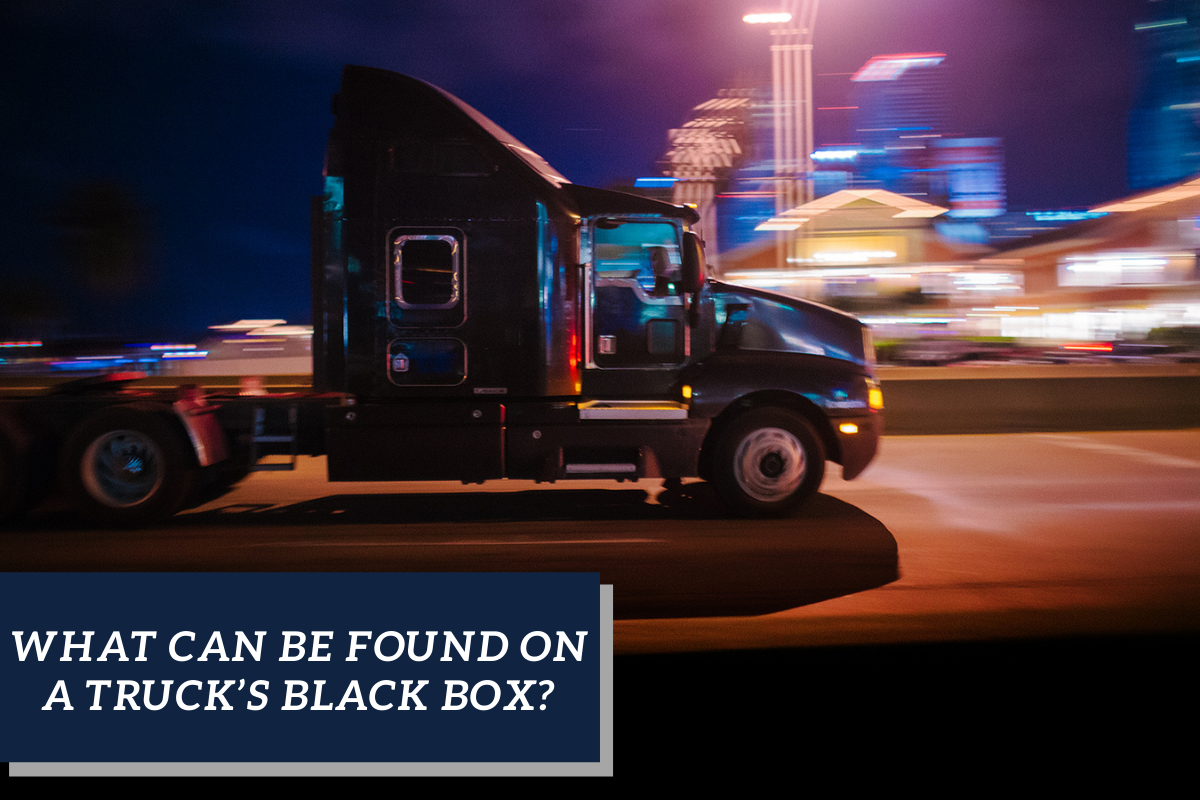
If you were injured in a truck accident caused by a negligent truck driver or trucking company in Lawrenceville, you could seek compensation from the at-fault party. However, truck accident cases are complex, and there are often multiple liable parties who could be responsible for compensating you. To establish liability, you will need to gather evidence that proves the truck driver or another party was responsible for the crash.
The semi-truck’s black box recorder could provide crucial evidence after a collision. Below, we will examine the different types of truck black boxes, the kinds of data you can typically find on a black box, and how our attorneys can help you obtain this type of evidence.
Types of Black Boxes
“Black box” is a broad term that refers to different data recording devices installed in most commercial trucks. Trucking companies use black boxes to monitor drivers’ actions and oversee driver safety. Some black boxes record at all times, while others only begin recording when a driver is involved in an “event” such as an accident.
Some of the most common types of devices that fall under the label “black box” include:
Event data recorders (EDRs) – When people refer to a truck’s “black box,” they usually mean the truck’s EDR. When the EDR detects an “event” occurring, such as a crash, it records information about the driver and the vehicle and preserves that data by storing it. EDRs can be triggered by numerous “events,” including a sudden change in speed, airbag deployment, and seat belt tensioner deployment. EDRs record information about speed, braking, clutch application, steering wheel use, and cruise control. This information can give you and your attorney insight into the truck driver’s actions before, during, and after a crash.
Electronic control modules (ECMs) – Most modern vehicles have a system of computers responsible for monitoring various elements of an engine. ECMs use sensors to control things like tire traction, anti-lock brakes, fuel injectors, and the vehicle’s transmission, among other systems. Anytime you get a check engine light on your dashboard, it’s usually because an ECM sensor determines that there was an issue somewhere in your vehicle’s engine. However, they can also be valuable data sources after a truck accident. ECMs record a truck’s engine speed, fuel emissions, tire pressure, and other data points.
Electronic logging devices (ELDs) – Truck drivers must abide by the Federal Motor Carrier Safety Administration’s (FMCSA) hours of service regulations. These regulations place a cap on the number of hours a truck driver can work before taking a break or going off duty. Unfortunately, some truck drivers violate these regulations because they are concerned about meeting deadlines. Trucking companies sometimes pressure truck drivers to work beyond their hours of service limits to make more deliveries and increase their bottom line. When truck drivers get overworked, they become fatigued and are more likely to cause accidents. ELDs are a digital timesheet that logs a truck driver’s hours on the road. The ELD can tell you when a truck’s engine was on, when it was in motion, and the distance it traveled before a crash.
If you were involved in an accident with a large commercial truck, the data recorded by the EDR, ECM, and ELD could help establish that the truck driver was at-fault for the crash. Without this data, it may be harder to get the truck driver or trucking company to accept liability.
What Evidence Can Be Gathered from a Truck’s Black Box?
Some of the information that can be retrieved from a truck’s black box includes:
- The direction the truck was traveling
- The speed the truck was traveling at the time of the crash
- The timing of brake application
- Steering wheel turns
- Whether the driver was wearing a seatbelt
- Airbag deployment during the crash
- If and when the driver stopped accelerating
- Stops the truck made leading up to the crash
- Mechanical failures or defects
Acquiring the necessary evidence to prove liability can be challenging to do on your own, especially when it comes to a truck’s EDR or data from other computer systems. The trucking company likely won’t just hand over this evidence, especially if the data included on the black box implicates the company or its driver. Trucking companies have been known to tamper with or erase the data contained on truck black boxes to avoid liability.
That’s why it is so essential to hire a skilled truck accident lawyer who has the resources to help you obtain this type of evidence before the trucking company can do anything to destroy it or alter it.
Why Are Black Boxes So Important in Truck Accident Investigations?
Truck black boxes are crucial to 18-wheeler accident claims because they can provide completely objective evidence of what transpired. The truck driver and trucking company may have their version of events, and their story may differ from yours. Their insurance company could use their armies of lawyers to try and shift the blame back to you.
If the data recorded on the black box shows that the truck driver was at fault for the accident, it will be challenging for the driver, the trucking company, or the insurance company to argue otherwise. And it will be nearly impossible for the trucking company to spin an alternative narrative for how the crash happened. Black box data is irrefutable.
Contact a Georgia 18-Wheeler Accident Lawyer Today
If you were injured in a truck accident that you believe was caused by the driver’s negligence, contact a Lawrenceville truck accident attorney at Brauns Law Accident and Injury Lawyers, PC today. We will move quickly to gather and preserve the evidence needed to establish negligence by any means necessary.
Contact us today for a free initial case review.


